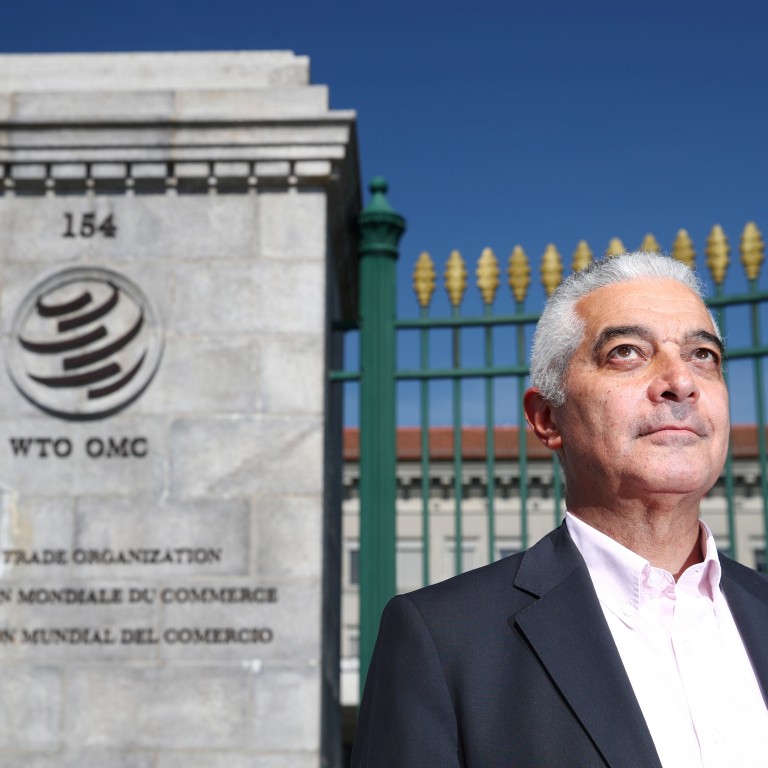
Exclusive | Hamid Mamdouh: US, China urged by WTO hopeful to avoid ‘old traps of cold war and rivalry’
- Hamid Mamdouh, Egypt’s nominee to lead the World Trade Organisation, says state business ‘subsidies run against the basic grain of the system’
- ‘There has always been the perception that you need a politician at the top of the WTO. I fundamentally disagree,’ the technocratic outsider says
Hamid Mamdouh, the Egyptian candidate to head the World Trade Organisation (WTO), has warned the United States and China against “falling back into old traps of cold war and rivalry”, as rising geopolitical tensions threaten to upend the global trade system.
The experienced Mamdouh, considered an outsider for the director general position with the Geneva-based body, said that both sides – as well as other trading nations – benefit from strong commercial ties and should try to “disentangle the trade part a bit, if you cannot completely separate it, but distinguish it because this is perhaps an area where you might end up with win-win outcomes, as opposed to mixing it with all other geopolitical tensions”.
The increased level of globalisation since the fall of the Soviet Union in 1991, however, means this “new cold war” risks disrupting global trade even more than the last one.
“That distinction [between trade and geopolitics] was very easy to make in the past because they weren’t intertwined, but now they are. And what we’re dealing with is conflicting national interests. That’s the brutal reality,” Mamdouh said in an interview with the South China Morning Post.
“So, how can we update our approach and our thinking to suit the new reality? Or are we going to fall back into old traps of cold war and rivalry without actually having a deeper look at the situation and see how we can minimise damages of conflicts?”
“There is a strong expectation that whomever takes the job will have to reform the system to deal with the modern world,” said a senior aide to numerous previous directors general, who preferred not to be identified.
“One of the problems is the current director general just hasn’t done his job; he has been timid and lazy and even got rid of the one process that could have made a difference,” the person added, referring to Azevedo’s perceived neglect of the WTO’s “Green Room” function, an informal name for meetings of smaller groups of WTO members, aimed at reaching preliminary agreements to be taken to larger groups of members.
There has always been the perception that you need a politician at the top of the WTO. I fundamentally disagree
“Bilateral solutions are so often more transactional in principle, and more short-lived than sustainable multilateral ones,” Mamdouh said. “The director general of the WTO would have a very important mediating role to play, but he or she needs to get the trust of both sides [and] would need to be very well versed in the substantive details of the problems.”
In this regard, Mamdouh has attempted to paint his main perceived weaknesses as a strength. He has never served in a ministerial government position, but he has spent much of his career at the WTO, as a division director, a senior counsellor, a negotiator and a drafter.

04:45
US, China and the "doomsday scenario" for the global trading system
“I think now is the time for the WTO to have a different kind of leadership,” Mamdouh said. “There has always been the perception that you need a politician at the top of the WTO. I fundamentally disagree. By politician, they mean an ex-minister. I say, over the past 25 years, we’ve always had politicians.
“We need to look at the substantive details of the problems. You cannot conveniently escape substance by calling it technical details. This is what we leaders have been doing for many years. If that’s what you want to do with the WTO, then that will be the beginning of the end of the WTO.”
One person who worked with Mamdouh at the WTO described him as “intellectually very capable, but lacking a political nose”, while another described him as “very solid, very professional, knows what he is talking about – maybe too much … sometimes to be creative you need not to be an expert”.
“Hamid has the stamina. If you like the technocrats, and if in the end the members say ‘I don’t want a politician, I want a technocrat’, then Hamid would be a great fit,” said a former WTO director, speaking anonymously amid concerns of being seen interfering in the race.
Others suggested that Mamdouh is “too focused on trade in services”, or that “some would see his positions as too close to the US ones. I’m not sure how China feels about him”.
Asked whether the WTO has the rulebook to deal with modern China, Mamdouh referred to “broader issues” such as a breakdown of the body’s negotiating function and the collapse of its appellate court last year.
The WTO club of 164 members, which is designed to set global trading rules, has not produced any major international accord since abandoning its “Doha Round” of negotiations in 2015.
Mamdouh was more definitive when it came to China’s perceived subsidisation of state-owned companies, which has long been a major bugbear of other members.
“Subsidies are a problem,” Mamdouh said. “We need more disciplines on subsidies, but I would look at industrial subsidies, and I would look also at agricultural subsidies, which have been a persistent problem.
“Subsidies run against the basic grain of the system, which is to avoid distorting subsidies that distort trade competition between countries. And we take it from there in a politically courageous way and an intellectually honest way as well – to make sure that we serve the common purpose of the system.”

